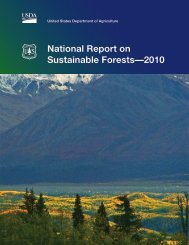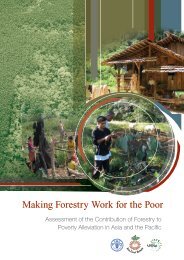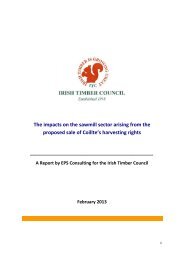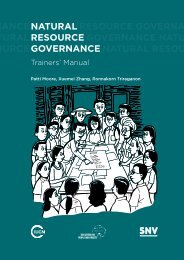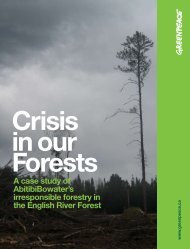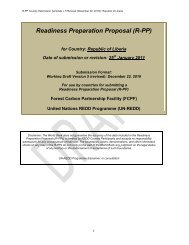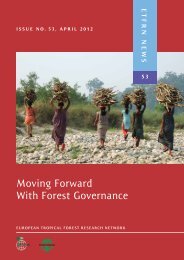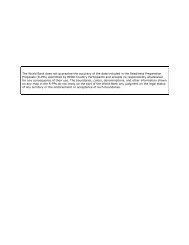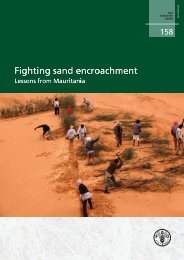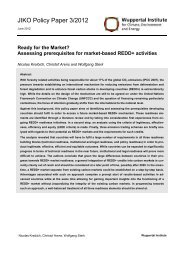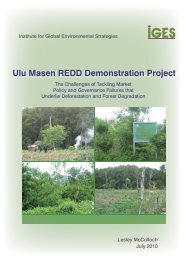UN-REDD Programme Year in Review 2009.pdf - part of its ...
UN-REDD Programme Year in Review 2009.pdf - part of its ...
UN-REDD Programme Year in Review 2009.pdf - part of its ...
Create successful ePaper yourself
Turn your PDF publications into a flip-book with our unique Google optimized e-Paper software.
<strong>UN</strong>-<strong>REDD</strong><br />
P R O G R A M M E<br />
2009<br />
<strong>Year</strong> <strong>in</strong> <strong>Review</strong><br />
un-redd.org<br />
WWW<br />
<strong>UN</strong>EP
<strong>UN</strong>-<strong>REDD</strong><br />
P R O G R A M M E<br />
The <strong>UN</strong>-<strong>REDD</strong> <strong>Programme</strong> is the United Nations collaborative <strong>in</strong>itiative on Reduc<strong>in</strong>g Emissions<br />
from Deforestation and forest Degradation (<strong>REDD</strong>) <strong>in</strong> develop<strong>in</strong>g countries. The <strong>Programme</strong><br />
was launched <strong>in</strong> 2008 and builds on the conven<strong>in</strong>g power and expertise <strong>of</strong> the Food and<br />
Agriculture Organization <strong>of</strong> the United Nations (FAO), the United Nations Development<br />
<strong>Programme</strong> (<strong>UN</strong>DP) and the United Nations Environment <strong>Programme</strong> (<strong>UN</strong>EP).<br />
The <strong>UN</strong>-<strong>REDD</strong> <strong>Programme</strong> supports nationally-driven, nationally-led <strong>REDD</strong>+ processes and<br />
promotes the <strong>in</strong>formed and mean<strong>in</strong>gful <strong>in</strong>volvement <strong>of</strong> all stakeholders, <strong>in</strong>clud<strong>in</strong>g Indigenous<br />
Peoples and other forest-dependent communities, <strong>in</strong> national and <strong>in</strong>ternational <strong>REDD</strong>+<br />
implementation. The <strong>Programme</strong> also works to build <strong>in</strong>ternational awareness and consensus<br />
about the importance <strong>of</strong> <strong>in</strong>clud<strong>in</strong>g <strong>REDD</strong>+ mechanisms <strong>in</strong> a future climate change agreement.<br />
<strong>UN</strong>EP
2009 | <strong>Year</strong> <strong>in</strong> <strong>Review</strong><br />
© Mark Edwards<br />
2009<br />
<strong>Year</strong> <strong>in</strong> <strong>Review</strong><br />
1. Introduction .................................................................................. 2<br />
2. Words from the Agencies ......................................................... 3<br />
3. Words from Norway ................................................................... 4<br />
4. National <strong>Programme</strong>s ....................................................5<br />
5. Global Activities ............................................................9<br />
5.1. MRV Achievements ............................................................................ 9<br />
5.2. Stakeholder Engagement ................................................................. 11<br />
5.3. Multiple Benef<strong>its</strong> Achievements ....................................................... 13<br />
5.4. Knowledge Management and Communications<br />
Activities .......................................................................................... 14<br />
5.5. Events .............................................................................................. 16<br />
6. Partnerships ................................................................19<br />
7. Fund<strong>in</strong>g ......................................................................20<br />
1
2009 | <strong>Year</strong> <strong>in</strong> <strong>Review</strong><br />
1. Introduction<br />
Just 18 months ago, the United Nations Secretary-General and the Prime<br />
M<strong>in</strong>ister <strong>of</strong> Norway launched a global <strong>in</strong>itiative to curb deforestation and forest<br />
degradation <strong>in</strong> develop<strong>in</strong>g countries, called the <strong>UN</strong>-<strong>REDD</strong> <strong>Programme</strong>. S<strong>in</strong>ce then,<br />
the <strong>Programme</strong> has grown to become a major multi-lateral <strong>in</strong>itiative support<strong>in</strong>g<br />
develop<strong>in</strong>g country <strong>REDD</strong>+ read<strong>in</strong>ess efforts.<br />
In March 2009, the <strong>UN</strong>-<strong>REDD</strong> <strong>Programme</strong> launched the <strong>in</strong>itial read<strong>in</strong>ess process<br />
(Phase 1) <strong>in</strong> n<strong>in</strong>e pilot countries. By the end <strong>of</strong> the same year a total <strong>of</strong> US$24<br />
million had been approved by the Policy Board for quick start action for country<br />
programmes to prepare national <strong>REDD</strong>+ strategies, engage stakeholders and<br />
develop MRV systems.<br />
At the global level, the <strong>UN</strong>-<strong>REDD</strong> <strong>Programme</strong> made a number <strong>of</strong> significant<br />
contributions <strong>in</strong> the area <strong>of</strong> measurement, report<strong>in</strong>g and verification (MRV),<br />
engagement <strong>of</strong> Indigenous Peoples and Civil Society <strong>in</strong> <strong>REDD</strong>+ activities, promotion<br />
<strong>of</strong> the multiple benef<strong>its</strong> <strong>of</strong> forests, and strengthen<strong>in</strong>g <strong>in</strong>teragency collaboration.<br />
All <strong>of</strong> this work, both at the national and global levels, was made possible by the<br />
commitment <strong>of</strong> pilot countries work<strong>in</strong>g <strong>in</strong> <strong>part</strong>nership with the three <strong>part</strong>icipat<strong>in</strong>g<br />
<strong>UN</strong> agencies (FAO, <strong>UN</strong>DP and <strong>UN</strong>EP) and with generous f<strong>in</strong>ancial contributions<br />
from Norway, as well as two new donors-- Denmark and Spa<strong>in</strong>-- who jo<strong>in</strong>ed the<br />
<strong>Programme</strong> <strong>in</strong> 2009.<br />
Through the experience and significant advances made by the pilot countries, the<br />
<strong>UN</strong>-<strong>REDD</strong> <strong>Programme</strong> quickly coalesced <strong>in</strong>to a community <strong>of</strong> practice for <strong>REDD</strong>+ that<br />
facilitated confidence build<strong>in</strong>g, shar<strong>in</strong>g <strong>of</strong> practical experiences among practitioners<br />
and created a space for broader stakeholder engagement.<br />
The <strong>part</strong>nerships that were cultivated with <strong>UN</strong>-<strong>REDD</strong> <strong>Programme</strong> countries and<br />
many <strong>in</strong>ternational <strong>part</strong>ners <strong>in</strong> 2009 provide a solid foundation on which countries<br />
can transform their national economies to low-carbon development pathways <strong>in</strong> a<br />
manner that benef<strong>its</strong> people and the environment.<br />
Yemi Katerere<br />
Head <strong>of</strong> the <strong>UN</strong>-<strong>REDD</strong> <strong>Programme</strong> Secretariat<br />
March 2010<br />
2
2009 | <strong>Year</strong> <strong>in</strong> <strong>Review</strong><br />
2. Words from the Agencies<br />
The <strong>UN</strong>-<strong>REDD</strong> <strong>Programme</strong> builds on the conven<strong>in</strong>g power and expertise <strong>of</strong> the Food and<br />
Agriculture Organization <strong>of</strong> the United Nations (FAO), the United Nations Development<br />
<strong>Programme</strong> (<strong>UN</strong>DP) and the United Nations Environment <strong>Programme</strong> (<strong>UN</strong>EP).<br />
“By assist<strong>in</strong>g develop<strong>in</strong>g countries to reduce emissions from<br />
forested lands and <strong>in</strong>vest <strong>in</strong> susta<strong>in</strong>able development, the <strong>UN</strong>-<br />
<strong>REDD</strong> <strong>Programme</strong> helps ma<strong>in</strong>ta<strong>in</strong> precious ecosystems and<br />
<strong>in</strong>crease resilience to climate change. It also supports the full<br />
<strong>part</strong>icipation <strong>of</strong> Indigenous Peoples and other communities who<br />
depend directly on forests for their livelihoods. By provid<strong>in</strong>g<br />
quality and timely assistance, this <strong>Programme</strong> embodies the ‘One<br />
<strong>UN</strong>’ approach, build<strong>in</strong>g on the comparative advantages and<br />
expertise <strong>of</strong> FAO, <strong>UN</strong>DP and <strong>UN</strong>EP.”<br />
Helen Clark<br />
<strong>UN</strong> Under-Secretary General<br />
and <strong>UN</strong>DP Adm<strong>in</strong>istrator<br />
“<strong>REDD</strong>+ falls squarely with<strong>in</strong> the core mission <strong>of</strong> the Food and<br />
Agriculture Organization <strong>of</strong> the United Nations, and it calls for<br />
holistic approaches to natural resources management and food<br />
security. It is about forestry, agriculture, food and energy systems,<br />
biodiversity, livelihoods, governance and land management, all<br />
<strong>in</strong> the context <strong>of</strong> climate change. The <strong>UN</strong>-<strong>REDD</strong> <strong>Programme</strong> is<br />
an example <strong>of</strong> the United Nations System deliver<strong>in</strong>g as one, and<br />
provides a great opportunity for us to effectively support our<br />
member states. The development <strong>of</strong> national measur<strong>in</strong>g, report<strong>in</strong>g<br />
and verification systems (MRV) is among the <strong>in</strong>itial challenges <strong>in</strong><br />
gett<strong>in</strong>g ready for <strong>REDD</strong>+. Such MRV systems are cornerstones <strong>of</strong><br />
<strong>REDD</strong>+, for ensur<strong>in</strong>g transparent and robust implementation. FAO<br />
draws from a vast experience <strong>in</strong> measurement and monitor<strong>in</strong>g <strong>of</strong><br />
natural resources, <strong>in</strong>clud<strong>in</strong>g their management and uses, for the<br />
benefit <strong>of</strong> countries <strong>part</strong>icipat<strong>in</strong>g <strong>in</strong> the <strong>UN</strong>-<strong>REDD</strong> <strong>Programme</strong>.”<br />
Jacques Diouf<br />
FAO Director-General<br />
“<strong>REDD</strong>+ represents a unique opportunity for combat<strong>in</strong>g climate<br />
change, biodiversity loss and environmental degradation. The<br />
<strong>UN</strong>-<strong>REDD</strong> <strong>Programme</strong> is a unique response to this opportunity-<br />
-one that holds the promise <strong>of</strong> contribut<strong>in</strong>g to improv<strong>in</strong>g lives<br />
and livelihoods, generat<strong>in</strong>g new employment prospects <strong>in</strong> natural<br />
resource management and boost<strong>in</strong>g the prospects for achiev<strong>in</strong>g<br />
the Millennium Development Goals. In short it is the Green<br />
Economy <strong>in</strong> action and a new development choice for countries<br />
<strong>in</strong> the Tropics and across the develop<strong>in</strong>g world.”<br />
Achim Ste<strong>in</strong>er<br />
<strong>UN</strong> Under-Secretary General<br />
and <strong>UN</strong>EP Executive Director<br />
3
2009 | <strong>Year</strong> <strong>in</strong> <strong>Review</strong><br />
3. Words from Norway<br />
Erik Solheim<br />
Norwegian M<strong>in</strong>ister<br />
<strong>of</strong> the Environment<br />
and International Cooperation<br />
“Norway is pleased to support this collaborative effort <strong>of</strong> <strong>UN</strong>EP,<br />
<strong>UN</strong>DP and FAO. The <strong>Programme</strong> br<strong>in</strong>gs the expertise <strong>of</strong> the <strong>UN</strong><br />
to the <strong>in</strong>ternational agenda <strong>of</strong> reduc<strong>in</strong>g emissions from the forest<br />
sector <strong>in</strong> develop<strong>in</strong>g countries.<br />
The <strong>UN</strong>-<strong>REDD</strong> <strong>Programme</strong> places the rights <strong>of</strong> <strong>in</strong>digenous people,<br />
susta<strong>in</strong>able livelihoods, governance and the ma<strong>in</strong>tenance <strong>of</strong><br />
biological and cultural diversity at the centre <strong>of</strong> <strong>in</strong>ternational and<br />
country-specific efforts to reduce the loss <strong>of</strong> forests <strong>in</strong> develop<strong>in</strong>g<br />
countries. It also supports capacity build<strong>in</strong>g <strong>in</strong> the field <strong>of</strong> technical<br />
forest monitor<strong>in</strong>g, and contributes to develop<strong>in</strong>g the <strong>in</strong>ternational<br />
knowledge base and global cooperation <strong>in</strong> this field.<br />
In close collaboration with forest countries that are mak<strong>in</strong>g a<br />
genu<strong>in</strong>e effort to beg<strong>in</strong> the extensive work on how to reduce<br />
national emissions from forests, the <strong>Programme</strong> helps to ensure<br />
that protect<strong>in</strong>g forests will contribute to economic, environmental<br />
and social development <strong>in</strong> develop<strong>in</strong>g countries.<br />
Moreover, the <strong>Programme</strong> has shown an impressive will to collaborate<br />
with other multi- and bilateral <strong>in</strong>itiatives <strong>in</strong> the field – and it is a<br />
strong example <strong>of</strong> the <strong>UN</strong> agencies work<strong>in</strong>g together as ‘One <strong>UN</strong>’.”<br />
About <strong>REDD</strong>+<br />
Reduc<strong>in</strong>g Emissions from Deforestation and Forest Degradation (<strong>REDD</strong>) is a mechanism to create an<br />
<strong>in</strong>centive for develop<strong>in</strong>g forested countries to protect, better manage and wisely use their forest resources,<br />
thus contribut<strong>in</strong>g to the global fight aga<strong>in</strong>st climate change. “<strong>REDD</strong>+” goes beyond deforestation and forest<br />
degradation, and <strong>in</strong>cludes the role <strong>of</strong> conservation, susta<strong>in</strong>able management <strong>of</strong> forests and enhancement<br />
<strong>of</strong> forest carbon stocks. <strong>REDD</strong>+ strives to make forests more valuable stand<strong>in</strong>g than cut down, by creat<strong>in</strong>g<br />
a f<strong>in</strong>ancial value for the carbon stored <strong>in</strong> stand<strong>in</strong>g trees. In the long term, payments for verified emission<br />
reductions and removals, either market or fund based, provide an <strong>in</strong>centive for <strong>REDD</strong>+ countries to further<br />
<strong>in</strong>vest <strong>in</strong> low-carbon development and a healthier, greener tomorrow.<br />
4<br />
© Masakazu Kashio
2009 | <strong>Year</strong> <strong>in</strong> <strong>Review</strong><br />
4. National <strong>Programme</strong>s<br />
The <strong>UN</strong>-<strong>REDD</strong> <strong>Programme</strong> pilot countries made significant<br />
<strong>in</strong>roads <strong>in</strong> 2009 <strong>in</strong> the preparation and implementation <strong>of</strong><br />
their national <strong>REDD</strong>+ strategies and mechanisms. Designed<br />
collaboratively by national stakeholders with the support <strong>of</strong><br />
the <strong>UN</strong>-<strong>REDD</strong> <strong>Programme</strong>, these national <strong>REDD</strong>+ strategies<br />
are pioneer<strong>in</strong>g the development <strong>of</strong> susta<strong>in</strong>able approaches,<br />
with a focus on <strong>in</strong>stitutional strengthen<strong>in</strong>g and broad<br />
stakeholder engagement.<br />
Overall Progress<br />
Six <strong>of</strong> the n<strong>in</strong>e <strong>UN</strong>-<strong>REDD</strong> <strong>Programme</strong> pilot countries submitted<br />
their <strong>in</strong>itial or full national programmes to the Policy Board <strong>in</strong><br />
2009, which <strong>in</strong> turn approved the budget allocation <strong>of</strong> US$24<br />
million for these countries. Three more pilot countries are<br />
expected to submit their national programme documents for<br />
approval <strong>in</strong> March 2010.<br />
Chart 1 (on page 6) provides an overview <strong>of</strong> the steps<br />
undertaken <strong>in</strong> the development <strong>of</strong> national <strong>UN</strong>-<strong>REDD</strong><br />
programmes. By December 2009, Tanzania, Viet Nam and the<br />
Democratic Republic <strong>of</strong> Congo had reached or gone beyond their <strong>in</strong>ception phases;<br />
Panama, Indonesia and Papua New Gu<strong>in</strong>ea entered their elaboration and approval<br />
phase; and the rema<strong>in</strong><strong>in</strong>g countries were f<strong>in</strong>aliz<strong>in</strong>g the formulation <strong>of</strong> their proposals.<br />
<strong>UN</strong>-<strong>REDD</strong> <strong>Programme</strong><br />
Pilot Countries:<br />
Africa:<br />
- Democratic Republic<br />
<strong>of</strong> Congo (DRC)<br />
- Tanzania<br />
- Zambia<br />
Asia and the Pacific:<br />
- Indonesia<br />
- Papua New Gu<strong>in</strong>ea<br />
- Viet Nam<br />
Lat<strong>in</strong> America and the Caribbean:<br />
- Bolivia<br />
- Panama<br />
- Paraguay<br />
New Members<br />
In October 2009, five new countries were welcomed to the <strong>Programme</strong> and given<br />
observer status to the <strong>UN</strong>-<strong>REDD</strong> Policy Board: Argent<strong>in</strong>a, Cambodia, Ecuador, Nepal<br />
and Sri Lanka. Current <strong>UN</strong>-<strong>REDD</strong> fund<strong>in</strong>g is programmed for <strong>its</strong> n<strong>in</strong>e pilot countries,<br />
but observer countries can take advantage <strong>of</strong> many other benef<strong>its</strong> <strong>of</strong> the <strong>UN</strong>-<strong>REDD</strong><br />
<strong>Programme</strong>, such as network<strong>in</strong>g, and knowledge shar<strong>in</strong>g, facilitated by the <strong>UN</strong>-<br />
<strong>REDD</strong> <strong>Programme</strong>’s onl<strong>in</strong>e community <strong>of</strong> practice through <strong>its</strong> dedicated workspace.<br />
Observer countries can also <strong>part</strong>icipate <strong>in</strong> global and regional workshops and have<br />
<strong>of</strong>ficial observer status at <strong>UN</strong>-<strong>REDD</strong> Policy Board meet<strong>in</strong>gs.<br />
© Masakazu Kashio<br />
5
2009 | <strong>Year</strong> <strong>in</strong> <strong>Review</strong><br />
Pham Manh Cuong<br />
National <strong>REDD</strong> Focal Po<strong>in</strong>t,<br />
M<strong>in</strong>istry <strong>of</strong> Agriculture<br />
and Rural Development<br />
Government <strong>of</strong> Viet Nam<br />
“Viet Nam has strongly committed to jo<strong>in</strong> <strong>in</strong>ternational efforts<br />
to respond to climate change <strong>in</strong> general, and <strong>in</strong> <strong>REDD</strong>+<br />
implementation <strong>in</strong> <strong>part</strong>icular. Thanks to valuable support from<br />
the <strong>UN</strong>-<strong>REDD</strong> <strong>Programme</strong> and from several other donors, Viet<br />
Nam is now speed<strong>in</strong>g up <strong>its</strong> capacity-build<strong>in</strong>g phase while<br />
prepar<strong>in</strong>g for the pilot<strong>in</strong>g phase. Coupled with the national<br />
policy on payments for environmental services, <strong>REDD</strong>+<br />
implementation is expected to halt deforestation and forest<br />
degradation and improve the livelihoods <strong>of</strong> millions liv<strong>in</strong>g<br />
<strong>in</strong> forested areas as well as to contribute to <strong>in</strong>ternational<br />
environmental benef<strong>its</strong>.”<br />
■ Pilot “Quick Start” Country Progress<br />
Whether a country is develop<strong>in</strong>g <strong>its</strong> programme or mov<strong>in</strong>g <strong>in</strong>to the <strong>in</strong>ception phase,<br />
lessons learned through national <strong>UN</strong>-<strong>REDD</strong> programmes <strong>in</strong> 2009 will benefit all<br />
future <strong>REDD</strong>+ activities. In 2009, these national “Quick Start” activities <strong>in</strong>cluded:<br />
The formulation <strong>of</strong> <strong>REDD</strong>+ Read<strong>in</strong>ess “Roadmaps”: These roadmaps have<br />
helped countries identify the required <strong>in</strong>terventions, as well as those for which<br />
the <strong>UN</strong>-<strong>REDD</strong> <strong>Programme</strong> has a comparative advantage. This has been the case<br />
<strong>in</strong> Zambia, Viet Nam, Papua New Gu<strong>in</strong>ea and the process is now be<strong>in</strong>g <strong>in</strong>itiated <strong>in</strong><br />
Cambodia. Mechanisms for strong stakeholder engagement have also been built<br />
<strong>in</strong>to the design <strong>of</strong> these country-level <strong>REDD</strong>+ roadmaps.<br />
Engagement <strong>of</strong> Stakeholders: The establishment <strong>of</strong> a broad-based consultation<br />
mechanism can dramatically <strong>in</strong>crease confidence <strong>in</strong> the process among all<br />
stakeholders. Indigenous groups and Civil Society stakeholders <strong>part</strong>icipated <strong>in</strong><br />
the elaboration <strong>of</strong> National <strong>Programme</strong> proposals, prior to their submission to<br />
the <strong>UN</strong>-<strong>REDD</strong> <strong>Programme</strong> Policy Board. In Panama, six experts from COONAPIP,<br />
(Coord<strong>in</strong>adora Nacional de Pueblos Indígenas de Panamá, an umbrella organization<br />
for Indigenous groups <strong>in</strong> the country) provided considerable time and <strong>in</strong>put to revise<br />
the Panama <strong>UN</strong>-<strong>REDD</strong> <strong>Programme</strong><br />
Document. In Paraguay, extensive<br />
Chart 1 : National <strong>Programme</strong> Development Process<br />
Scop<strong>in</strong>g/<br />
Formulation<br />
3-6 months<br />
Policy<br />
Board<br />
approval<br />
Approval<br />
<strong>of</strong> funds<br />
allocation<br />
Elaboration<br />
and approval<br />
National<br />
<strong>Programme</strong><br />
Document<br />
signature<br />
Inception<br />
3-6 months 3 months<br />
Release <strong>of</strong><br />
funds from<br />
MDTF<br />
Inception<br />
Report<br />
Quarterly<br />
Budget<br />
consultations with Indigenous<br />
communities have been a<br />
priority. Stakeholder engagement,<br />
however, is not limited to civil<br />
society. For example, <strong>in</strong> the DRC a<br />
scop<strong>in</strong>g mission <strong>in</strong> January 2009<br />
organized jo<strong>in</strong>tly with the FCPF set<br />
a precedent, <strong>in</strong>volv<strong>in</strong>g staff from<br />
three <strong>UN</strong> agencies, the World<br />
Bank, the Norwegian government<br />
and three <strong>in</strong>ternational NGOs, as<br />
well as a national team led by<br />
the <strong>UN</strong>FCCC and <strong>REDD</strong> Focal<br />
Po<strong>in</strong>t, and over 40 representatives<br />
from Congolese Civil Society and<br />
Indigenous Peoples.<br />
6
2009 | <strong>Year</strong> <strong>in</strong> <strong>Review</strong><br />
Establishment <strong>of</strong> transparent <strong>REDD</strong>+ implementation frameworks:<br />
Def<strong>in</strong><strong>in</strong>g the rights and roles <strong>of</strong> stakeholders was a key area <strong>of</strong> national<br />
programme development <strong>in</strong> 2009. With<strong>in</strong> this framework, the <strong>UN</strong>-<strong>REDD</strong><br />
<strong>Programme</strong> supported the design <strong>of</strong> an equitable benefit distribution system <strong>in</strong><br />
Viet Nam. The challenges <strong>of</strong> ownership rights to resources, <strong>in</strong>clud<strong>in</strong>g forest land<br />
tenure and forest resource rights, will rema<strong>in</strong> a focus for 2010 and beyond.<br />
Build<strong>in</strong>g Consensus through strategy sett<strong>in</strong>g: Pilot countries recognized that<br />
identify<strong>in</strong>g the drivers <strong>of</strong> deforestation needed to be done <strong>in</strong> a way that leads to<br />
national consensus; otherwise no strategy or implementation plan to address them<br />
will work. Throughout the development and <strong>in</strong>ception <strong>of</strong> national programmes,<br />
emphasis has been placed on cross-sectoral activities and engagement. It is also<br />
important to position a <strong>REDD</strong>+ strategy <strong>in</strong> the context <strong>of</strong> a broader process. In<br />
Papua New Gu<strong>in</strong>ea, a low-carbon development strategy was prepared, and <strong>in</strong> Viet<br />
Nam the <strong>REDD</strong>+ strategy is now anchored with<strong>in</strong> a “National Target <strong>Programme</strong>”<br />
to address climate change.<br />
Design<strong>in</strong>g Carbon Monitor<strong>in</strong>g Systems: Emphasis was placed <strong>in</strong> 2009 on<br />
monitor<strong>in</strong>g, report<strong>in</strong>g and verification (MRV) for carbon, <strong>in</strong>clud<strong>in</strong>g the cont<strong>in</strong>ued<br />
development <strong>of</strong> remote sens<strong>in</strong>g for forest area data and the role <strong>of</strong> national<br />
forest <strong>in</strong>ventories. In the Democratic Republic <strong>of</strong> Congo, for example, both<br />
components will <strong>in</strong> turn support the country’s national greenhouse gas <strong>in</strong>ventory.<br />
“Tanzania is committed to mak<strong>in</strong>g <strong>REDD</strong>+ a success and we are<br />
grateful for the support we are gett<strong>in</strong>g from the Governments <strong>of</strong><br />
F<strong>in</strong>land and Norway, the <strong>UN</strong>-<strong>REDD</strong> <strong>Programme</strong> and Forest Carbon<br />
Partnership Facility. With the technical support <strong>of</strong> the <strong>UN</strong>-<strong>REDD</strong><br />
<strong>Programme</strong>, we hope that our capacity to handle <strong>REDD</strong>+ related issues<br />
will be enhanced especially <strong>in</strong> the area <strong>of</strong> monitor<strong>in</strong>g, report<strong>in</strong>g and<br />
verification (MRV). We place emphasis on carbon account<strong>in</strong>g and how<br />
our efforts will benefit local communities and those liv<strong>in</strong>g adjacent to<br />
the forests. Improv<strong>in</strong>g their livelihoods is a crucial concern.”<br />
Felician Kilahama<br />
Director, Forestry and<br />
Beekeep<strong>in</strong>g Division<br />
Government <strong>of</strong> Tanzania<br />
© Arsenio Ella Ella<br />
©Masakazu Kashio<br />
7
2009 | <strong>Year</strong> <strong>in</strong> <strong>Review</strong><br />
■ <strong>UN</strong>-<strong>REDD</strong> <strong>Programme</strong> Pilot Country Progress<br />
Pilot Country<br />
Bolivia<br />
Democratic<br />
Republic<br />
<strong>of</strong> Congo<br />
Indonesia<br />
Panama<br />
Papua New<br />
Gu<strong>in</strong>ea<br />
Paraguay<br />
Tanzania<br />
Viet Nam<br />
Zambia<br />
Progress<br />
- Cont<strong>in</strong>ues to develop <strong>its</strong> national <strong>UN</strong>-<strong>REDD</strong> programme<br />
- National <strong>REDD</strong> team has been formed<br />
- Full programme and fund<strong>in</strong>g request to be presented to <strong>UN</strong>-<strong>REDD</strong> Policy Board <strong>in</strong><br />
March 2010<br />
- Initial DRC <strong>UN</strong>-<strong>REDD</strong> programme and US$1.9 million <strong>in</strong> fund<strong>in</strong>g approved by <strong>UN</strong>-<br />
<strong>REDD</strong> Policy Board <strong>in</strong> March<br />
- Received fund<strong>in</strong>g from <strong>UN</strong>-<strong>REDD</strong> <strong>Programme</strong> <strong>in</strong> June<br />
- Conducted a number <strong>of</strong> workshops with civil society<br />
- Signed decree support<strong>in</strong>g <strong>REDD</strong> and creat<strong>in</strong>g <strong>in</strong>stitutional architecture <strong>in</strong> November<br />
- Full national <strong>UN</strong>-<strong>REDD</strong> programme to be presented to the <strong>UN</strong>-<strong>REDD</strong> Policy Board and<br />
FCPF for approval <strong>in</strong> March 2010<br />
- Full Indonesia <strong>UN</strong>-<strong>REDD</strong> programme and US$5.6 million <strong>in</strong> fund<strong>in</strong>g approved by<br />
<strong>UN</strong>-<strong>REDD</strong> Policy Board <strong>in</strong> March<br />
- Indonesia’s M<strong>in</strong>istry <strong>of</strong> Forestry formally signed <strong>Programme</strong> document <strong>in</strong> November<br />
- Plann<strong>in</strong>g <strong>its</strong> <strong>in</strong>ception workshop for March 2010<br />
- Comprehensive consultation process with 11 Indigenous congresses took place <strong>in</strong><br />
October <strong>in</strong> Panama to review national programme before submission<br />
- Full Panama <strong>UN</strong>-<strong>REDD</strong> programme and US$5.3 million <strong>in</strong> fund<strong>in</strong>g approved by <strong>UN</strong>-<br />
<strong>REDD</strong> Policy Board <strong>in</strong> October<br />
- Panama expected to enter <strong>its</strong> elaboration phase <strong>in</strong> early 2010<br />
- Initial Papua New Gu<strong>in</strong>ea <strong>UN</strong>-<strong>REDD</strong> programme and US$2.6 million <strong>in</strong> fund<strong>in</strong>g<br />
approved <strong>in</strong> March<br />
- <strong>UN</strong>-<strong>REDD</strong> Policy Board earmarked additional US$3.8 million <strong>in</strong> fund<strong>in</strong>g <strong>in</strong> October<br />
- Cont<strong>in</strong>ues to draft full national programme<br />
- Cont<strong>in</strong>ues to develop <strong>its</strong> national <strong>UN</strong>-<strong>REDD</strong> programme<br />
- A number <strong>of</strong> consultation workshops with IP groups were held throughout 2009<br />
- Jo<strong>in</strong>t <strong>Programme</strong> document expected to be presented to <strong>UN</strong>-<strong>REDD</strong> Policy Board <strong>in</strong> 2010<br />
- Full Tanzania <strong>UN</strong>-<strong>REDD</strong> programme and US$4.3 million <strong>in</strong> fund<strong>in</strong>g approved by <strong>UN</strong>-<br />
<strong>REDD</strong> Policy Board <strong>in</strong> March<br />
- Launched national <strong>REDD</strong> <strong>in</strong>itiative <strong>in</strong> August<br />
- Government formally signed programme document <strong>in</strong> November, Tanzania <strong>UN</strong>-<br />
<strong>REDD</strong> <strong>Programme</strong> launched <strong>in</strong> the same month<br />
- Full Viet Nam <strong>UN</strong>-<strong>REDD</strong> programme and US$4.4 million <strong>in</strong> fund<strong>in</strong>g approved by<br />
<strong>UN</strong>-<strong>REDD</strong> Policy Board <strong>in</strong> March<br />
- Received fund<strong>in</strong>g from <strong>UN</strong>-<strong>REDD</strong> <strong>Programme</strong> <strong>in</strong> October<br />
- National and local <strong>in</strong>ception workshops conducted <strong>in</strong> September and November to<br />
launch implementation <strong>of</strong> <strong>its</strong> national <strong>UN</strong>-<strong>REDD</strong> <strong>Programme</strong><br />
- Government-led Benefit Distribution System study conducted <strong>in</strong> September-<br />
November and launched at COP-15<br />
- <strong>Programme</strong> is now fully operational and under implementation<br />
- Cont<strong>in</strong>ues to develop <strong>its</strong> national <strong>UN</strong>-<strong>REDD</strong> programme<br />
- Zambia <strong>UN</strong>-<strong>REDD</strong> programme to be presented to <strong>UN</strong>-<strong>REDD</strong> Policy Board for<br />
approval <strong>in</strong> March 2010<br />
Increas<strong>in</strong>g Demand for <strong>UN</strong>-<strong>REDD</strong><br />
Throughout 2009, the <strong>UN</strong>-<strong>REDD</strong> <strong>Programme</strong> received an <strong>in</strong>creas<strong>in</strong>g number <strong>of</strong> formal<br />
requests from countries want<strong>in</strong>g to jo<strong>in</strong> the <strong>Programme</strong>, <strong>in</strong>clud<strong>in</strong>g Costa Rica, Mexico,<br />
Nigeria, Republic <strong>of</strong> Congo, Solomon Islands and Sudan. The <strong>UN</strong>-<strong>REDD</strong> <strong>Programme</strong><br />
rema<strong>in</strong>s open to requests from all countries, and has granted observer status to the<br />
<strong>UN</strong>-<strong>REDD</strong> Policy Board to every country which has formally applied to the <strong>Programme</strong><br />
to-date. As more fund<strong>in</strong>g becomes available, the <strong>Programme</strong> hopes to support even<br />
more national programmes. Build<strong>in</strong>g on the results achieved <strong>in</strong> 2009, the <strong>Programme</strong><br />
will also cont<strong>in</strong>ue to extend support to areas <strong>of</strong> benefit distribution, governance, MRV,<br />
and environmental and social benef<strong>its</strong> from <strong>REDD</strong>+.<br />
8
2009 | <strong>Year</strong> <strong>in</strong> <strong>Review</strong><br />
5. Global Activities<br />
At the <strong>in</strong>ternational level, the <strong>UN</strong>-<strong>REDD</strong> <strong>Programme</strong> seeks<br />
to build consensus and knowledge about <strong>REDD</strong>+ and raise<br />
awareness about the importance <strong>of</strong> <strong>in</strong>clud<strong>in</strong>g a <strong>REDD</strong>+<br />
mechanism <strong>in</strong> a post-2012 climate change agreement. It also<br />
provides opportunities for dialogue between governments,<br />
civil society organizations and technical experts, to ensure<br />
that <strong>REDD</strong>+ efforts are based on science and take <strong>in</strong>to<br />
account the views and needs <strong>of</strong> all stakeholders.<br />
© Mart<strong>in</strong> Harvey<br />
The <strong>UN</strong>-<strong>REDD</strong> <strong>Programme</strong> br<strong>in</strong>gs together technical teams<br />
from around the world to develop common approaches,<br />
analyses and guidel<strong>in</strong>es on issues such as measurement,<br />
report<strong>in</strong>g and verification (MRV) <strong>of</strong> carbon emissions and<br />
flows, remote sens<strong>in</strong>g, and greenhouse gas <strong>in</strong>ventories. It<br />
provides guidance on how best to design and implement<br />
<strong>REDD</strong>+, to ensure that forests cont<strong>in</strong>ue to provide multiple<br />
benef<strong>its</strong> for livelihoods and biodiversity to societies while<br />
stor<strong>in</strong>g carbon at the same time. The <strong>Programme</strong> is also<br />
deeply committed to support<strong>in</strong>g the engagement <strong>of</strong><br />
Indigenous Peoples and Civil Society Organizations <strong>in</strong> the<br />
design and implementation <strong>of</strong> <strong>REDD</strong>+ strategies.<br />
5.1. MRV Achievements<br />
A cost-effective, robust and compatible system for MRV <strong>of</strong> greenhouse gas emissions<br />
is an essential component <strong>in</strong> the implementation <strong>of</strong> <strong>REDD</strong>+. MRV is one <strong>of</strong> the <strong>UN</strong>-<br />
<strong>REDD</strong> <strong>Programme</strong>’s ma<strong>in</strong> work areas, and considerable progress was made on this<br />
front <strong>in</strong> 2009.<br />
MRV Achievements<br />
As member countries began the implementation <strong>of</strong> their National <strong>Programme</strong>s, the<br />
<strong>UN</strong>-<strong>REDD</strong> <strong>Programme</strong> worked with them to develop MRV methodologies tailored to<br />
their specific <strong>REDD</strong>+ <strong>in</strong>itiatives. In the DRC and Tanzania, for example, they are now<br />
able to generate and <strong>in</strong>corporate estimates for forest-related emission factors <strong>in</strong>to their<br />
national greenhouse gas <strong>in</strong>ventories. And this progress is hav<strong>in</strong>g a ripple effect-- the<br />
DRC’s National Forest Inventory will, <strong>in</strong> turn, be a template for the def<strong>in</strong>ition <strong>of</strong> a possible<br />
regional approach <strong>in</strong> the Congo Bas<strong>in</strong>.<br />
The <strong>UN</strong>-<strong>REDD</strong> <strong>Programme</strong> also worked diligently throughout 2009 to<br />
develop a “framework proposal” for a fully-operational national MRV<br />
system that will support the <strong>in</strong>tegration <strong>of</strong> <strong>REDD</strong>+ mechanisms <strong>in</strong>to<br />
other mechanisms under the United Nations Framework Convention on<br />
Climate Change (<strong>UN</strong>FCCC). To this end, FAO signed a Memorandum <strong>of</strong><br />
Understand<strong>in</strong>g with Brazil’s Space Agency (INPE) <strong>in</strong> December, to jo<strong>in</strong>tly<br />
develop a land monitor<strong>in</strong>g system us<strong>in</strong>g remote sens<strong>in</strong>g data that will<br />
help <strong>in</strong>dividual countries establish MRV systems.<br />
The <strong>UN</strong>-<strong>REDD</strong> <strong>Programme</strong> explored a systematic review <strong>of</strong> the exist<strong>in</strong>g<br />
evidence on methods to measure and assess terrestrial carbon stocks<br />
and carbon stock changes. Such tools are useful for critical appraisal,<br />
summary and dissem<strong>in</strong>ation <strong>of</strong> results from a large volume <strong>of</strong> research<br />
and they can help <strong>in</strong> decision mak<strong>in</strong>g by provid<strong>in</strong>g an objective,<br />
<strong>in</strong>dependent, and unbiased assessment <strong>of</strong> the best available evidence.<br />
Landsat GLS 2000 image <strong>of</strong> Tanzania (Central<br />
Zambezian Miombo woodlands ecoregion).<br />
Location: 6°S 34°E. Elevation <strong>of</strong> the tile<br />
center po<strong>in</strong>t: 1501m.<br />
9
2009 | <strong>Year</strong> <strong>in</strong> <strong>Review</strong><br />
“I th<strong>in</strong>k the <strong>UN</strong>-<strong>REDD</strong> <strong>Programme</strong> can make a very significant<br />
contribution to <strong>REDD</strong>. It’s already made a difference on MRV and<br />
has emerged as a leader on governance. Provid<strong>in</strong>g <strong>in</strong>centives<br />
for good governance and track<strong>in</strong>g changes over time will be<br />
fundamental for <strong>REDD</strong> to work. <strong>UN</strong>-<strong>REDD</strong> has a role to play<br />
<strong>in</strong> assist<strong>in</strong>g countries on monitor<strong>in</strong>g governance and build<strong>in</strong>g<br />
their capacity. I would urge <strong>UN</strong>-<strong>REDD</strong> to cont<strong>in</strong>ue on <strong>its</strong> path<br />
and make the best <strong>of</strong> the opportunity provided by <strong>REDD</strong> to build<br />
transparent and effective forest governance.”<br />
Rosal<strong>in</strong>d Reeve<br />
Forest Campaign Manager,<br />
Global Witness<br />
MRV Events<br />
The <strong>UN</strong>-<strong>REDD</strong> <strong>Programme</strong> co-sponsored several MRV events throughout the year,<br />
<strong>in</strong>clud<strong>in</strong>g: the National Forest Inventory workshop <strong>in</strong> India <strong>in</strong> April; the GHGs<br />
Inventory workshop <strong>in</strong> Bonn <strong>in</strong> August; the Forest Degradation Expert meet<strong>in</strong>g <strong>in</strong><br />
early September at FAO <strong>in</strong> Rome; and the Capacity Build<strong>in</strong>g Workshop <strong>in</strong> Barcelona<br />
<strong>in</strong> November.<br />
In September, the <strong>Programme</strong> convened an MRV meet<strong>in</strong>g with representatives from<br />
<strong>UN</strong>-<strong>REDD</strong> countries, FAO, <strong>UN</strong>DP, <strong>UN</strong>EP and a few other <strong>in</strong>stitutions, dur<strong>in</strong>g which an<br />
MRV framework and toolkit were presented and discussed with <strong>part</strong>icipants from<br />
various <strong>UN</strong>-<strong>REDD</strong> <strong>Programme</strong> countries. Members presented the current status <strong>of</strong><br />
their MRV developments and gave valuable <strong>in</strong>puts on the MRV strategy and tools<br />
be<strong>in</strong>g developed by the <strong>UN</strong>-<strong>REDD</strong> <strong>Programme</strong>. Countries were able to learn from<br />
the experiences <strong>of</strong> other <strong>UN</strong>-<strong>REDD</strong> projects, establish priorities for capacity build<strong>in</strong>g<br />
activities, and ga<strong>in</strong> technical advice on MRV systems.<br />
MRV Resources<br />
The <strong>UN</strong>-<strong>REDD</strong> <strong>Programme</strong> also published several important work<strong>in</strong>g papers on MRV,<br />
<strong>in</strong>clud<strong>in</strong>g technical reviews, assessment <strong>of</strong> available tools and guidel<strong>in</strong>es, and case<br />
studies <strong>of</strong> countries <strong>in</strong> preparation for <strong>REDD</strong>+ implementation (available at un-redd.<br />
org). <strong>UN</strong>-<strong>REDD</strong> member and observer countries were also given access to ready-touse<br />
moderate-resolution satellite remote sens<strong>in</strong>g data for the years 1990, 2000 and<br />
2005, to help <strong>in</strong> the development <strong>of</strong> national MRV systems.<br />
10<br />
© Masakazu Kashio
2009 | <strong>Year</strong> <strong>in</strong> <strong>Review</strong><br />
5.2. Stakeholder Engagement<br />
The <strong>UN</strong>-<strong>REDD</strong> <strong>Programme</strong> supported the engagement and <strong>part</strong>icipation <strong>of</strong><br />
Indigenous Peoples and Civil Society organizations at both global and national<br />
levels, follow<strong>in</strong>g an engagement strategy that <strong>in</strong>cluded:<br />
• Active representation <strong>in</strong> the govern<strong>in</strong>g body <strong>of</strong> the <strong>UN</strong>-<strong>REDD</strong> <strong>Programme</strong><br />
• Global and national outreach and consultations<br />
• Support to the establishment <strong>of</strong> national systems that <strong>in</strong>clude the <strong>part</strong>icipation <strong>of</strong><br />
all stakeholders <strong>in</strong> the design, implementation and monitor<strong>in</strong>g <strong>of</strong> <strong>REDD</strong>+ processes<br />
• Support to the establishment <strong>of</strong> an <strong>in</strong>dependent Civil Society Advisory Group<br />
on Rights, Forests, and Climate Change that <strong>of</strong>fers advice and guidance to<br />
the <strong>Programme</strong><br />
This approach was guided by the pr<strong>in</strong>ciples <strong>of</strong> representation, transparency, access<br />
to <strong>in</strong>formation, accountability, <strong>part</strong>icipation and <strong>in</strong>clusion.<br />
In consultation with representatives <strong>of</strong> Indigenous Peoples and Civil<br />
Society, the <strong>UN</strong>-<strong>REDD</strong> <strong>Programme</strong> developed an operational guidance<br />
on the Engagement <strong>of</strong> Indigenous Peoples and other Forest Dependent<br />
Communities. The guidance <strong>in</strong>forms the design, implementation,<br />
monitor<strong>in</strong>g and evaluation <strong>of</strong> <strong>UN</strong>-<strong>REDD</strong> <strong>Programme</strong> activities at the global<br />
and national level, and provides best practice advice on how to consult<br />
with Indigenous Peoples and other forest dependent communities.<br />
Governance<br />
Indigenous Peoples and Civil Society organizations are represented both as<br />
full members and as observers to the <strong>UN</strong>-<strong>REDD</strong> <strong>Programme</strong> Policy Board,<br />
provid<strong>in</strong>g leadership, direction and decisions on f<strong>in</strong>ancial allocations to<br />
ensure the overall success <strong>of</strong> the <strong>UN</strong>-<strong>REDD</strong> <strong>Programme</strong>. Full membership<br />
<strong>in</strong>cludes one representative <strong>of</strong> Indigenous Peoples – the Chair <strong>of</strong> the <strong>UN</strong><br />
Permanent Forum on Indigenous Issues - and one representative from a Civil Society<br />
organization. Their <strong>in</strong>terventions at the Policy Board are supported by six observers (one<br />
Indigenous Peoples and one Civil Society representative per region). The Indigenous<br />
Peoples representatives were self-selected by the regional caucuses at the Indigenous<br />
Peoples Global Summit on Climate Change held <strong>in</strong> Anchorage, Alaska and the CSO<br />
representatives were identified through an extensive self-selection process managed by<br />
the Rights and Resources Initiative.<br />
© Mart<strong>in</strong> Harvey<br />
Institutionaliz<strong>in</strong>g the engagement <strong>of</strong> Indigenous Peoples and Civil Society<br />
<strong>in</strong> the <strong>REDD</strong> Process: Good Practice <strong>in</strong> the DRC<br />
Engag<strong>in</strong>g Civil Society organizations and Indigenous Peoples can be a complex process, especially<br />
<strong>in</strong> countries where relationships have been tense <strong>in</strong> the past. The Democratic Republic <strong>of</strong><br />
Congo, which has begun implement<strong>in</strong>g <strong>its</strong> read<strong>in</strong>ess activities with the support <strong>of</strong> the <strong>UN</strong>-<strong>REDD</strong><br />
<strong>Programme</strong>, has been able to bridge the gaps. Decree number 09140, drafted collaboratively<br />
dur<strong>in</strong>g the first <strong>UN</strong>-<strong>REDD</strong>/FCPF mission <strong>in</strong> January 2009 and signed by the Prime M<strong>in</strong>ister on 23<br />
November 2009, <strong>in</strong>stitutionalizes the <strong>part</strong>icipation <strong>of</strong> Civil Society <strong>in</strong> the <strong>REDD</strong> National Committee.<br />
The Decree specifies that the <strong>REDD</strong> National Committee comprises one environmental and<br />
rural development NGO representative, two representatives <strong>of</strong> Indigenous Peoples and forest<br />
communities, one representative <strong>of</strong> a research NGO, along with government, private sector and<br />
academic representatives. A Climate and <strong>REDD</strong> Civil Society work<strong>in</strong>g group has been constituted to<br />
<strong>in</strong>form the process, and Civil Society representatives are <strong>part</strong> <strong>of</strong> the Negotiations Task Force, whose<br />
<strong>part</strong>icipation <strong>in</strong> COP-15 was funded <strong>in</strong> <strong>part</strong> by the <strong>UN</strong>-<strong>REDD</strong> <strong>Programme</strong>.<br />
11
2009 | <strong>Year</strong> <strong>in</strong> <strong>Review</strong><br />
Formulat<strong>in</strong>g the <strong>UN</strong>-<strong>REDD</strong> National <strong>Programme</strong>: a consultative process <strong>in</strong> Panama<br />
The new <strong>REDD</strong> Committee <strong>in</strong> Panama was launched on 18 September 2009 under the jo<strong>in</strong>t agreement<br />
that ANAM (the National Environmental Authority), COONAPIP (the National Coord<strong>in</strong>at<strong>in</strong>g Body <strong>of</strong><br />
Indigenous Peoples <strong>of</strong> Panama) and the <strong>UN</strong>-<strong>REDD</strong> <strong>Programme</strong> would work <strong>in</strong> close collaboration,<br />
with support <strong>of</strong> the Smithsonian Institute, towards the elaboration <strong>of</strong> the <strong>UN</strong>-<strong>REDD</strong> Panama National<br />
<strong>Programme</strong>. COONAPIP designated six Indigenous representatives to support a coord<strong>in</strong>ated review by 65<br />
<strong>in</strong>dividuals, who would study the draft programme document and provide <strong>in</strong>put. These representatives,<br />
whose time and work were compensated, represented various technical expertise, <strong>in</strong>clud<strong>in</strong>g gender<br />
specialists and legal experts. On 30 October the <strong>UN</strong>-<strong>REDD</strong> Panama National <strong>Programme</strong> Document was<br />
presented to the <strong>UN</strong>-<strong>REDD</strong> <strong>Programme</strong> Policy Board meet<strong>in</strong>g <strong>in</strong> Wash<strong>in</strong>gton, DC, where the President <strong>of</strong><br />
COONAPIP <strong>part</strong>icipated alongside the representative from ANAM and fund<strong>in</strong>g allocation for the Panama<br />
National <strong>Programme</strong> was approved. “Without the capacity, expertise and <strong>in</strong>put from this group,”<br />
reflected Santiago Carrizosa, <strong>REDD</strong> Regional Technical Adviser for Lat<strong>in</strong> America and the Caribbean,<br />
“we would not have been able to achieve this outcome.”<br />
Outreach, consultations and <strong>part</strong>icipation<br />
In 2009, the <strong>UN</strong>-<strong>REDD</strong> <strong>Programme</strong> organized global and national outreach<br />
consultations to ensure that the <strong>in</strong>terests and concerns <strong>of</strong> Civil Society and Indigenous<br />
Peoples were cont<strong>in</strong>uously reflected <strong>in</strong> program activities and outcomes.<br />
At the national level, the <strong>UN</strong>-<strong>REDD</strong> <strong>Programme</strong> requires that<br />
National <strong>Programme</strong>s are validated <strong>in</strong> country as an <strong>in</strong>itial step<br />
<strong>of</strong> an ongo<strong>in</strong>g consultative process that ensures Civil Society<br />
engagement. Practical examples <strong>of</strong> this early engagement process<br />
are, <strong>in</strong> Panama, the jo<strong>in</strong>t development <strong>of</strong> the Panama <strong>UN</strong>-<strong>REDD</strong><br />
<strong>Programme</strong> document and, <strong>in</strong> the Democratic Republic <strong>of</strong> Congo,<br />
the <strong>in</strong>stitutionalization by Decree <strong>of</strong> the engagement <strong>of</strong> Civil<br />
Society <strong>in</strong> the <strong>REDD</strong>+ process.<br />
At the <strong>in</strong>ternational level, the <strong>UN</strong>-<strong>REDD</strong> <strong>Programme</strong> and <strong>part</strong>ners<br />
organized a regional consultation <strong>in</strong> Bangkok, <strong>part</strong>icipated actively<br />
<strong>in</strong> the Indigenous Peoples Global Summit on Climate Change <strong>in</strong><br />
Alaska, the Permanent Forum on Indigenous Issues <strong>in</strong> New York,<br />
the Lat<strong>in</strong> American Forum on <strong>REDD</strong>+ <strong>in</strong> Manaus, the Mesoamerican<br />
Dialogue on <strong>REDD</strong>+ <strong>in</strong> San Salvador, the Asia Summit on Climate<br />
Change and Indigenous Peoples <strong>in</strong> Bali, and the <strong>UN</strong>FCCC COP-15,<br />
<strong>in</strong> Copenhagen.<br />
© Saxxar<strong>in</strong> TolerTmongkol<br />
Civil Society Advisory Group<br />
Based on the terms <strong>of</strong> reference established dur<strong>in</strong>g the first<br />
meet<strong>in</strong>g <strong>of</strong> the <strong>UN</strong>-<strong>REDD</strong> <strong>Programme</strong> Policy Board, the <strong>Programme</strong><br />
is now receiv<strong>in</strong>g advice from this <strong>in</strong>dependent group with the<br />
mandate to ensure that climate <strong>in</strong>vestments <strong>in</strong> forest areas are<br />
effective and support forest peoples’ rights and development.<br />
Current membership <strong>of</strong> the Group consists <strong>of</strong> a diverse set <strong>of</strong><br />
<strong>in</strong>stitutions from Africa, Asia and the Pacific, Europe, Lat<strong>in</strong> America<br />
and research and advocacy communities, <strong>in</strong>clud<strong>in</strong>g Rights and<br />
Resources Initiative, Ra<strong>in</strong>forest Foundation-Norway and UK, FPP,<br />
FERN, InterCooperation, RECOFTC, ACICAFOC, Civic Response<br />
and TEBTEBBA. The advice provided is freely shared with other<br />
Civil Society actors to ensure transparency.<br />
12
2009 | <strong>Year</strong> <strong>in</strong> <strong>Review</strong><br />
5.3. Multiple Benef<strong>its</strong> Achievements<br />
In addition to their carbon storage role, forests provide many other<br />
ecosystem services to society. The nature <strong>of</strong> these services varies from<br />
place to place, and <strong>in</strong>cludes water regulation, soil protection, nontimber<br />
forest products <strong>in</strong>clud<strong>in</strong>g food and fibre, climate regulation<br />
and biodiversity. As most tropical forests deliver a wide range <strong>of</strong><br />
these essential services, there are many ways <strong>in</strong> which <strong>REDD</strong>+ can<br />
provide ‘multiple benef<strong>its</strong>’ to countries and forest communities.<br />
The <strong>UN</strong>-<strong>REDD</strong> <strong>Programme</strong> devoted considerable resources <strong>in</strong> 2009<br />
to exam<strong>in</strong><strong>in</strong>g and understand<strong>in</strong>g the likely multiple benef<strong>its</strong> and<br />
risks associated with <strong>REDD</strong>+ <strong>in</strong>itiatives before they are implemented.<br />
These issues were explored <strong>in</strong> a technical paper, “Multiple Benef<strong>its</strong> –<br />
Issues and Options for <strong>REDD</strong>”, which was released at the <strong>UN</strong>-<strong>REDD</strong><br />
Policy Board meet<strong>in</strong>g <strong>in</strong> June 2009.<br />
©Gillian Allard<br />
Work<strong>in</strong>g with Countries<br />
Identify<strong>in</strong>g and fulfill<strong>in</strong>g the needs expressed by pilot countries was a key priority for<br />
the <strong>Programme</strong> <strong>in</strong> 2009. Multiple benef<strong>its</strong> consultations on national requirements<br />
were held with Tanzania, and through missions to Viet Nam, Indonesia, and Bolivia.<br />
These consultations resulted <strong>in</strong> work plans for 2010 that <strong>in</strong>clude guidance on how<br />
to def<strong>in</strong>e and promote <strong>REDD</strong>+ co-benef<strong>its</strong>, especially <strong>in</strong> the areas <strong>of</strong> afforestation,<br />
forest restoration and reforestation; and the compilation <strong>of</strong> a meta-database on<br />
carbon, biodiversity and other co-benef<strong>its</strong> for Bolivia. Further consultation and<br />
collaboration with <strong>UN</strong>-<strong>REDD</strong> pilot countries is anticipated <strong>in</strong> 2010.<br />
A dedicated two-week spatial analysis<br />
workshop on co-benef<strong>its</strong> was held <strong>in</strong><br />
Cambridge, with <strong>UN</strong>-<strong>REDD</strong> <strong>Programme</strong><br />
staff at <strong>UN</strong>EP’s World Conservation<br />
Monitor<strong>in</strong>g Centre (WCMC) and staff<br />
from Tanzania’s M<strong>in</strong>istry <strong>of</strong> Natural<br />
Resources and Tourism. The group<br />
undertook national-scale analyses <strong>of</strong><br />
co-benef<strong>its</strong> and other factors, <strong>in</strong>clud<strong>in</strong>g<br />
population density, honey/beeswax/<br />
gum production, and mammal<br />
and amphibian species richness. In<br />
addition, the workshop produced<br />
a new comb<strong>in</strong>ed soil and biomass<br />
carbon map for Tanzania, which was<br />
launched at Forest Day 3 <strong>in</strong> December.<br />
To explore the relationship between<br />
carbon storage <strong>in</strong> forests and ecosystem<br />
services at a global scale, a revised map<br />
<strong>of</strong> carbon storage <strong>in</strong> biomass and soils<br />
<strong>in</strong> various countries was also produced<br />
at <strong>UN</strong>EP-WCMC, <strong>in</strong> collaboration with<br />
Stanford University (USA) and the<br />
EC’s Jo<strong>in</strong>t Research Centre and with<br />
additional support from the German<br />
government, for use <strong>in</strong> the <strong>UN</strong>-<strong>REDD</strong><br />
<strong>Programme</strong> and elsewhere.<br />
The <strong>UN</strong>-<strong>REDD</strong> <strong>Programme</strong> worked with Tanzania <strong>in</strong> 2009 to produce this <strong>in</strong>itial<br />
comb<strong>in</strong>ed soil and biomass carbon map for Tanzania, which was launched at Forest<br />
Day 3 <strong>in</strong> December. Here it is shown together with priority areas for selected nontimber<br />
forest products (Tanzania National Land Use Plann<strong>in</strong>g Commission 2006).<br />
13
2009 | <strong>Year</strong> <strong>in</strong> <strong>Review</strong><br />
5.4. Knowledge Management and Communications<br />
Activities<br />
The <strong>UN</strong>-<strong>REDD</strong> <strong>Programme</strong> <strong>in</strong>itiated, developed and executed a dynamic knowledgeshar<strong>in</strong>g<br />
and communications strategy <strong>in</strong> 2009 that was successful <strong>in</strong> rais<strong>in</strong>g the<br />
pr<strong>of</strong>ile and awareness <strong>of</strong> the <strong>Programme</strong>.<br />
Chart 1. Number <strong>of</strong> Vis<strong>its</strong><br />
and Pages Viewed follow<strong>in</strong>g<br />
the re-launched <strong>of</strong> the public<br />
website<br />
Vis<strong>its</strong>: the number <strong>of</strong> times that uniquely<br />
identified requests from repeat users or new<br />
users were made to the server<br />
Page views: the total number <strong>of</strong> requests<br />
for html pages from the server.<br />
Communication materials<br />
The <strong>UN</strong>-<strong>REDD</strong> <strong>Programme</strong> created a strong visual<br />
identity <strong>in</strong> 2009 with branded brochures, leaflets,<br />
posters, banners, DVDs and USB keys that were<br />
widely distributed at events and dur<strong>in</strong>g <strong>in</strong>-country<br />
missions.<br />
<strong>UN</strong>-<strong>REDD</strong>.org<br />
The <strong>Programme</strong>’s most important communications<br />
tool is <strong>its</strong> public website- www.un-redd.org- and<br />
dur<strong>in</strong>g 2009, the site was significantly enhanced and<br />
re-launched <strong>in</strong> June. It now features more dynamic<br />
and up-to-date news and <strong>in</strong>formation about the<br />
<strong>Programme</strong>’s national and global activities, as well<br />
as broader <strong>REDD</strong>+ issues. S<strong>in</strong>ce the re-launch,<br />
website activity has <strong>in</strong>creased dramatically, from a<br />
few hundred page views <strong>in</strong> May to almost 50,000<br />
by December. The site now also features social<br />
network<strong>in</strong>g tools such as Twitter, blogg<strong>in</strong>g and a l<strong>in</strong>k<br />
to the <strong>UN</strong>-<strong>REDD</strong> <strong>Programme</strong> Channel on YouTube.<br />
E-Newsletter<br />
Another key communications tool developed for the <strong>Programme</strong> <strong>in</strong> 2009 was the <strong>UN</strong>-<br />
<strong>REDD</strong> e-Newsletter. S<strong>in</strong>ce the <strong>in</strong>augural issue <strong>in</strong> August, the monthly newsletter has<br />
grown to feature news articles, country updates, guest columnists and analysis reports,<br />
all with an aim to <strong>in</strong>form and update the <strong>Programme</strong>’s key target audiences. Current<br />
distribution <strong>of</strong> the newsletter reaches an estimated 13,000 policy makers, <strong>in</strong>-country<br />
and <strong>in</strong>ternational technical staff, NGOs, CSOs and staff <strong>in</strong> <strong>in</strong>ternational organizations.<br />
Multimedia Campaign<br />
The <strong>Programme</strong> also executed a successful<br />
multimedia campaign throughout 2009.<br />
Several short videos on <strong>REDD</strong>+ were<br />
produced and screened at high-pr<strong>of</strong>ile<br />
events, <strong>in</strong>clud<strong>in</strong>g the Secretary-General’s<br />
High level event on <strong>REDD</strong>+ with more<br />
than 85 governments, <strong>in</strong>clud<strong>in</strong>g 14<br />
heads <strong>of</strong> state and senior m<strong>in</strong>isters <strong>in</strong><br />
attendance. These videos helped set the<br />
agenda for <strong>REDD</strong>+ and position the <strong>UN</strong>-<br />
<strong>REDD</strong> <strong>Programme</strong> as a key player.<br />
The <strong>Programme</strong> also sponsored two Earth<br />
Report documentaries on <strong>REDD</strong>+ that were<br />
researched and filmed on location, and<br />
broadcast on BBC World News, reach<strong>in</strong>g 302<br />
million homes <strong>in</strong> 170 countries <strong>in</strong> the run up<br />
to COP-15.<br />
© Biosphoto - Montford Thierry<br />
14
2009 | <strong>Year</strong> <strong>in</strong> <strong>Review</strong><br />
© Christ<strong>of</strong>orus Terry<br />
Media and Education Outreach<br />
The <strong>Programme</strong> also worked with CIFOR, the EU and Panos London to develop a<br />
multimedia “Report<strong>in</strong>g on <strong>REDD</strong>” tra<strong>in</strong><strong>in</strong>g kit, <strong>in</strong>clud<strong>in</strong>g a media guide, a video news<br />
release, a short film on <strong>REDD</strong>+ and a publication on the status <strong>of</strong> negotiations. This<br />
kit was distributed widely dur<strong>in</strong>g COP-15. As an example <strong>of</strong> concrete application,<br />
Save The Ra<strong>in</strong>forest Inc., a non-pr<strong>of</strong>it organization <strong>in</strong> the United States that organizes<br />
youth campaigns developed a curriculum on <strong>REDD</strong>+ us<strong>in</strong>g the brief and the videos<br />
<strong>in</strong>cluded <strong>in</strong> the “Report<strong>in</strong>g <strong>REDD</strong>” multimedia pack, as a primer for North American<br />
students to understand the fundamentals <strong>of</strong> <strong>REDD</strong>+.<br />
“The <strong>UN</strong>-<strong>REDD</strong> <strong>Programme</strong> plays a key role <strong>in</strong> build<strong>in</strong>g the<br />
capacity <strong>of</strong> develop<strong>in</strong>g countries so that they can actively<br />
<strong>part</strong>icipate <strong>in</strong> global efforts to reduce deforestation. Trees<br />
are not only carbon s<strong>in</strong>ks; millions <strong>of</strong> rural people depend on<br />
trees <strong>in</strong> forests and agricultural landscapes for food, fuel and<br />
medic<strong>in</strong>e. <strong>UN</strong>-<strong>REDD</strong> is a valued <strong>part</strong>ner <strong>in</strong> meet<strong>in</strong>g the challenge<br />
<strong>of</strong> reduc<strong>in</strong>g deforestation and promot<strong>in</strong>g land management<br />
practices that store carbon, enhance biodiversity, and susta<strong>in</strong><br />
rural livelihoods.”<br />
Dennis Garrity<br />
Director General, World<br />
Agr<strong>of</strong>orestry Centre<br />
<strong>UN</strong>-<strong>REDD</strong> Workspace<br />
In 2009, the <strong>UN</strong>-<strong>REDD</strong> <strong>Programme</strong> established <strong>its</strong> onl<strong>in</strong>e Collaborative Workspace<br />
(www.unredd.net), which serves as a fully-<strong>in</strong>tegrated, adaptable onl<strong>in</strong>e platform<br />
for communication, document shar<strong>in</strong>g, work plann<strong>in</strong>g and onl<strong>in</strong>e collaborative<br />
edit<strong>in</strong>g and schedul<strong>in</strong>g and an extensive contact database. It is the repository <strong>of</strong><br />
all <strong>in</strong>formation related to the activities <strong>of</strong> the <strong>UN</strong>-<strong>REDD</strong> <strong>Programme</strong> at the national<br />
and global levels and <strong>of</strong>fers the flexibility <strong>of</strong> transferr<strong>in</strong>g this <strong>in</strong>formation to external<br />
platforms such as the <strong>UN</strong>-<strong>REDD</strong> <strong>Programme</strong> web site.<br />
The Workspace is now used by more than 350 users from <strong>UN</strong> agency headquarters,<br />
<strong>UN</strong> teams <strong>in</strong> countries, donors, <strong>part</strong>ners and national counter<strong>part</strong>s <strong>in</strong> <strong>UN</strong>-<strong>REDD</strong><br />
member and observer countries.<br />
15
2009 | <strong>Year</strong> <strong>in</strong> <strong>Review</strong><br />
5.5. Events<br />
The <strong>UN</strong>-<strong>REDD</strong> <strong>Programme</strong> worked throughout 2009 to build the <strong>in</strong>ternational<br />
consensus needed to advance the <strong>REDD</strong>+ agenda.<br />
■ Highlights<br />
Jo<strong>in</strong>t presentation to Norwegian Parliamentarians, Oslo: January 2009<br />
In a jo<strong>in</strong>t presentation to members <strong>of</strong> the Parliament <strong>of</strong> Norway, the <strong>UN</strong>-<strong>REDD</strong><br />
<strong>Programme</strong> and the World Bank’s Forest Carbon Partnership Facility (FCPF) and Forest<br />
Investment <strong>Programme</strong> (FIP) presented their <strong>in</strong>itiatives and collaboration to provide<br />
<strong>REDD</strong>+ support services to develop<strong>in</strong>g countries.<br />
Committee on Forestry N<strong>in</strong>eteenth session, Rome: 18 March 2009<br />
The <strong>UN</strong>-<strong>REDD</strong> <strong>Programme</strong>, the FCPF and the FIP jo<strong>in</strong>tly mapped out their <strong>REDD</strong><br />
<strong>in</strong>itiatives <strong>in</strong> front <strong>of</strong> an audience <strong>of</strong> 500 forest experts at the Committee on Forestry,<br />
highlight<strong>in</strong>g the opportunities for collaboration and sketch<strong>in</strong>g the roles <strong>of</strong> each<br />
<strong>in</strong>itiative to support countries on their path to <strong>REDD</strong>+ read<strong>in</strong>ess.<br />
<strong>UN</strong> Permanent Forum on Indigenous Issues,<br />
New York, jo<strong>in</strong>t session: May 2009<br />
At the occasion <strong>of</strong> the Eighth session <strong>of</strong> the <strong>UN</strong> Permanent Forum on Indigenous<br />
Issues, a panel chaired by the United Nations University and composed <strong>of</strong> members<br />
<strong>of</strong> the <strong>UN</strong>-<strong>REDD</strong> <strong>Programme</strong>, the Chair <strong>of</strong> the Permanent Forum and a representative<br />
<strong>of</strong> the Indigenous Peoples’ Alliance <strong>of</strong> the Archipelago (AMAN) discussed the<br />
opportunities and risks <strong>of</strong> <strong>REDD</strong>+ to an engaged audience <strong>of</strong> 200. The <strong>Programme</strong><br />
presented <strong>its</strong> activities on engagement <strong>of</strong> Indigenous Peoples and other forestdependent<br />
communities and <strong>in</strong> <strong>part</strong>icular <strong>its</strong> related Operational Guidance.<br />
SBSTA Meet<strong>in</strong>g, Bonn, Jo<strong>in</strong>t Side event: 9 June 2009<br />
The <strong>UN</strong>-<strong>REDD</strong> <strong>Programme</strong> <strong>in</strong> <strong>part</strong>nership with Global Witness held a successful side<br />
event dur<strong>in</strong>g the Climate Talks at the M<strong>in</strong>istry <strong>of</strong> Environment build<strong>in</strong>g <strong>in</strong> Bonn.<br />
The event focused on MRV, multiple benef<strong>its</strong> for ecosystems and livelihoods and<br />
governance as key issues for <strong>REDD</strong>+ implementation, and explored implementation<br />
issues <strong>in</strong>clud<strong>in</strong>g <strong>in</strong>stitutional capacities and the role <strong>of</strong> <strong>in</strong>dependent monitor<strong>in</strong>g<br />
aspects on MRV for <strong>REDD</strong>+.<br />
<strong>UN</strong> Photo/Paulo Filgueiras<br />
<strong>UN</strong> Secretary-General Ban Ki-moon spoke at a high-level event on<br />
<strong>REDD</strong>+ <strong>in</strong> September 2009. The Secretary-General emphasized<br />
the pivotal role <strong>of</strong> the world’s forests <strong>in</strong> prevent<strong>in</strong>g environmental<br />
catastrophe.<br />
The United Nations Secretary-<br />
General’s High-Level Event on <strong>REDD</strong><br />
<strong>in</strong> New York: 23 September 2009<br />
In an unprecedented display <strong>of</strong> cooperation<br />
between developed and develop<strong>in</strong>g<br />
countries on climate change, 18 Heads<br />
<strong>of</strong> State and over 100 other dignitaries<br />
gathered at <strong>UN</strong> headquarters <strong>in</strong> New York<br />
to publicly express their commitment<br />
and support for <strong>REDD</strong>+. The <strong>UN</strong>-<strong>REDD</strong><br />
<strong>Programme</strong> helped coord<strong>in</strong>ate the<br />
<strong>part</strong>icipation <strong>of</strong> over 100 governments,<br />
provided video content to kick <strong>of</strong>f the<br />
meet<strong>in</strong>g, and was <strong>in</strong>strumental <strong>in</strong> br<strong>in</strong>g<strong>in</strong>g<br />
key people from civil society, <strong>in</strong>clud<strong>in</strong>g<br />
local and <strong>in</strong>ternational NGOs, media, and<br />
the private sector to the meet<strong>in</strong>g.<br />
16
2009 | <strong>Year</strong> <strong>in</strong> <strong>Review</strong><br />
XIII World Forestry Congress <strong>in</strong> Buenos Aires- <strong>UN</strong>-<strong>REDD</strong><br />
Side Event: 23 October 2009<br />
Over 200 people <strong>part</strong>icipated <strong>in</strong> the <strong>UN</strong>-<strong>REDD</strong> <strong>Programme</strong> side event<br />
that showcased the <strong>UN</strong>-<strong>REDD</strong> <strong>Programme</strong>’s support to country efforts to<br />
get ready for <strong>REDD</strong>+. The event’s discussions re<strong>in</strong>forced the message that<br />
<strong>REDD</strong>+ is doable and <strong>of</strong>fers an opportunity for forestry to become a key<br />
contributor <strong>in</strong> the development <strong>of</strong> forest management approaches that<br />
are environmentally, socially and economically susta<strong>in</strong>able.<br />
<strong>UN</strong>FCCC’s Climate Change Talks <strong>in</strong> Barcelona- <strong>UN</strong>-<strong>REDD</strong><br />
<strong>Programme</strong> Side Event: 4 November 2009<br />
In front <strong>of</strong> more than 100 <strong>in</strong>ternational audience members, <strong>UN</strong><br />
agencies and other <strong>part</strong>ners work<strong>in</strong>g on <strong>REDD</strong>+ highlighted lessons<br />
learned from <strong>in</strong>itial <strong>REDD</strong>+ read<strong>in</strong>ess activities. They addressed the<br />
challenges <strong>of</strong> <strong>REDD</strong>+ monitor<strong>in</strong>g and discussed how <strong>REDD</strong>+ can<br />
help ensure equitable development for forest-dependent people.<br />
Presentations explored: <strong>REDD</strong>+ and Biodiversity; Achiev<strong>in</strong>g Multiple<br />
Benef<strong>its</strong>; National Read<strong>in</strong>ess Management Arrangements; and<br />
<strong>REDD</strong> read<strong>in</strong>ess: MRV Progress.<br />
Over 200 people <strong>part</strong>icipated <strong>in</strong> the <strong>UN</strong>-<strong>REDD</strong><br />
<strong>Programme</strong> side event at the XIII World Forestry<br />
Congress that took place <strong>in</strong> Buenos Aires,<br />
Argent<strong>in</strong>a, on 23 October 2009.<br />
<strong>UN</strong> High Level Conference on South-South Cooperation<br />
<strong>in</strong> Nairobi- <strong>UN</strong>-<strong>REDD</strong> <strong>Programme</strong> Side Event: 2 December 2009<br />
Dur<strong>in</strong>g the <strong>UN</strong> High Level Conference on South-South Cooperation, the <strong>UN</strong>-<strong>REDD</strong><br />
<strong>Programme</strong> led a side event on <strong>REDD</strong>+ which was attended by many country and<br />
stakeholder representatives. The <strong>UN</strong>-<strong>REDD</strong> <strong>Programme</strong>’s audio-visual presentation was<br />
followed by a lively discussion about South-South collaboration and specific questions<br />
about <strong>REDD</strong>+. The <strong>Programme</strong> was encouraged by the number <strong>of</strong> countries express<strong>in</strong>g<br />
<strong>in</strong>terest <strong>in</strong> jo<strong>in</strong><strong>in</strong>g and by the endorsements it received from various <strong>part</strong>icipants.<br />
<strong>UN</strong>FCCC COP-15 <strong>in</strong> Copenhagen: 5-17 December 2009<br />
The <strong>UN</strong>-<strong>REDD</strong> <strong>Programme</strong> hosted and <strong>part</strong>icipated <strong>in</strong> a number <strong>of</strong> events dur<strong>in</strong>g the<br />
Conference. Activities kicked <strong>of</strong>f with a presentation on the <strong>UN</strong>-<strong>REDD</strong> <strong>Programme</strong><br />
aboard the Climate Express Tra<strong>in</strong> runn<strong>in</strong>g from Brussels to Copenhagen on 5<br />
December. At Forest Day 3, the <strong>UN</strong>-<strong>REDD</strong> <strong>Programme</strong> hosted several learn<strong>in</strong>g<br />
session <strong>in</strong>clud<strong>in</strong>g one <strong>in</strong> <strong>part</strong>nership with the Forest Carbon Partnership Facility<br />
(FCPF), dur<strong>in</strong>g which the <strong>Programme</strong> highlighted the results achieved <strong>in</strong> <strong>its</strong> n<strong>in</strong>e<br />
pilot countries. The <strong>Programme</strong> also contributed to the “Rural Livelihoods” event<br />
organized by <strong>UN</strong>DP, and co-hosted MRV and biodiversity events. On 16 December,<br />
the <strong>Programme</strong> provided support to and <strong>part</strong>icipated <strong>in</strong> the Avoided Deforestation<br />
Partners event on <strong>REDD</strong>+.<br />
“We applaud the <strong>UN</strong>-<strong>REDD</strong> <strong>Programme</strong> for mak<strong>in</strong>g the world more<br />
aware <strong>of</strong> the very positive impact that reduc<strong>in</strong>g deforestation will<br />
have <strong>in</strong> sav<strong>in</strong>g our climate. Furthermore, the <strong>UN</strong>-<strong>REDD</strong> <strong>Programme</strong>,<br />
by build<strong>in</strong>g on the strengths <strong>of</strong> FAO, <strong>UN</strong>DP and <strong>UN</strong>EP, is perfectly<br />
positioned to play an important role <strong>in</strong> mitigat<strong>in</strong>g climate change<br />
through <strong>its</strong> far reach<strong>in</strong>g and respected operations throughout<br />
the world. For <strong>REDD</strong> to succeed, we will need effective read<strong>in</strong>ess<br />
plans tailored to a broad range <strong>of</strong> develop<strong>in</strong>g countries. The <strong>UN</strong>-<br />
<strong>REDD</strong> team is uniquely qualified to facilitate this effort with their<br />
proven skills as honest brokers <strong>in</strong> open<strong>in</strong>g dialogues between<br />
governments, civil society organizations and technical experts.”<br />
Jeffrey Horowitz<br />
Found<strong>in</strong>g Partner, Avoided<br />
Deforestation Partners<br />
17
2009 | <strong>Year</strong> <strong>in</strong> <strong>Review</strong><br />
■ <strong>UN</strong>-<strong>REDD</strong> <strong>Programme</strong> Policy Board Meet<strong>in</strong>gs<br />
The <strong>UN</strong>-<strong>REDD</strong> <strong>Programme</strong> Policy Board met three times throughout 2009 to<br />
provide overall leadership, strategic direction and approvals <strong>of</strong> f<strong>in</strong>ancial allocations<br />
to ensure the overall success <strong>of</strong> the <strong>Programme</strong>. The Policy Board is made up <strong>of</strong><br />
representatives from <strong>part</strong>ner countries, donors to the Multi-Donor Trust Fund, Civil<br />
Society, Indigenous Peoples and the three <strong>UN</strong> agencies.<br />
1 st Policy Board<br />
9-10 March 2009<br />
Gamboa, Panama<br />
Dur<strong>in</strong>g <strong>its</strong> first meet<strong>in</strong>g, the <strong>UN</strong>-<strong>REDD</strong> Policy Board took important steps toward<br />
lay<strong>in</strong>g the govern<strong>in</strong>g framework for the <strong>Programme</strong>, <strong>in</strong>clud<strong>in</strong>g approv<strong>in</strong>g the Terms<br />
<strong>of</strong> Reference <strong>of</strong> the Policy Board and Rules <strong>of</strong> Procedure and Operational Guidance <strong>of</strong><br />
the <strong>Programme</strong>. The Board approved budgets for national programmes <strong>in</strong> Tanzania,<br />
Viet Nam, Indonesia, the Democratic Republic <strong>of</strong> Congo, and Papua New Gu<strong>in</strong>ea, and<br />
for the Global <strong>Programme</strong>. It endorsed the Terms <strong>of</strong> Reference for the Independent<br />
Civil Society Advisory Group, and emphasized the importance <strong>of</strong> the MRV work. The<br />
Policy Board also underscored the importance for the collaboration between the<br />
<strong>UN</strong>-<strong>REDD</strong> <strong>Programme</strong> and the FCPF.<br />
The 2nd <strong>UN</strong>-<strong>REDD</strong> Policy Board meet<strong>in</strong>g marked the first time that<br />
the full membership <strong>of</strong> the board had been <strong>in</strong> session, <strong>in</strong>clud<strong>in</strong>g<br />
Indigenous Peoples and Civil Society organizations, the <strong>UN</strong>FCCC,<br />
the World Bank, and the Global Environment Facility.<br />
2 nd Policy Board<br />
14-15 June 2009<br />
Montreux, Switzerland<br />
At <strong>its</strong> second meet<strong>in</strong>g, the Policy Board welcomed<br />
the establishment <strong>of</strong> the <strong>UN</strong>-<strong>REDD</strong> <strong>Programme</strong><br />
Secretariat. The Board also welcomed the<br />
<strong>in</strong>dication <strong>of</strong> possible fund<strong>in</strong>g by the Government<br />
<strong>of</strong> Denmark. It acknowledged the progress made<br />
by Viet Nam, Paraguay, Bolivia and Zambia,<br />
earmarked funds for Panama, and stressed the<br />
need for significant <strong>in</strong>volvement <strong>of</strong> Indigenous<br />
Peoples and Civil Society organizations, especially<br />
at the national level. The Board also granted<br />
Australia, Ecuador, Honduras, Uganda and the<br />
United States <strong>of</strong> America observer status to the<br />
2nd Policy Board meet<strong>in</strong>g.<br />
3 rd Policy Board<br />
29-30 October 2009<br />
Wash<strong>in</strong>gton D.C., USA<br />
At the third Policy Board meet<strong>in</strong>g,<br />
Argent<strong>in</strong>a, Cambodia, Ecuador, Sri Lanka<br />
and Nepal were granted observer status to<br />
the <strong>Programme</strong>. The Board expressed <strong>its</strong><br />
satisfaction with the grow<strong>in</strong>g cooperation<br />
between the <strong>UN</strong>-<strong>REDD</strong> <strong>Programme</strong> and<br />
FCPF and emphasized their complementary<br />
roles. US$3.8 million was earmarked for<br />
Papua New Gu<strong>in</strong>ea’s National <strong>Programme</strong>,<br />
and the Board approved Panama’s fund<strong>in</strong>g<br />
allocation request <strong>of</strong> US$5.3 million for <strong>its</strong><br />
National <strong>Programme</strong>. Denmark became<br />
the second donor to the <strong>UN</strong>-<strong>REDD</strong><br />
<strong>Programme</strong>, committ<strong>in</strong>g US$2 million.<br />
Mr. Epiménides Díaz, Sub-Adm<strong>in</strong>istrator<br />
General <strong>of</strong> Panama’s National Environmental<br />
Authority (ANAM), and Mr. Olav Kjørven,<br />
Assistant Secretary-General <strong>of</strong> the United<br />
Nations and <strong>UN</strong>DP’s Director <strong>of</strong> the Bureau for<br />
Development Policy were co-chairs <strong>of</strong> the 3rd<br />
<strong>UN</strong>-<strong>REDD</strong> <strong>Programme</strong> Policy Board meet<strong>in</strong>g <strong>in</strong><br />
October 2009.<br />
18
2009 | <strong>Year</strong> <strong>in</strong> <strong>Review</strong><br />
6. Partnerships<br />
Collaboration is at the heart <strong>of</strong> the <strong>UN</strong>-<strong>REDD</strong> <strong>Programme</strong> and some <strong>of</strong> our most<br />
important accomplishments <strong>in</strong> 2009 would not have been possible without the<br />
contributions <strong>of</strong> our valued <strong>part</strong>ners.<br />
The <strong>UN</strong>-<strong>REDD</strong> <strong>Programme</strong> worked closely with the Forest Carbon Partnership<br />
Facility (FCPF) throughout the year to harmonize national <strong>REDD</strong>+ read<strong>in</strong>ess processes<br />
and conduct jo<strong>in</strong>t missions to member countries <strong>in</strong> order to avoid duplication, <strong>in</strong>crease<br />
efficiency and reduce transaction costs to the countries. The <strong>Programme</strong> also coord<strong>in</strong>ated<br />
Policy Board meet<strong>in</strong>gs to co<strong>in</strong>cide with FCPF’s Participants meet<strong>in</strong>gs throughout 2009,<br />
to maximize resources and reduce travel costs for mutual stakeholders.<br />
The <strong>UN</strong>-<strong>REDD</strong> <strong>Programme</strong> cont<strong>in</strong>ued to work closely with the <strong>UN</strong>FCCC<br />
Secretariat <strong>in</strong> support<strong>in</strong>g the implementation <strong>of</strong> <strong>UN</strong>FCCC decisions,<br />
provid<strong>in</strong>g <strong>in</strong>formation and lessons learned from the pilot countries,<br />
preparation <strong>of</strong> technical papers as well as work<strong>in</strong>g jo<strong>in</strong>tly on <strong>UN</strong> Chief<br />
Executives Body (CEB) <strong>REDD</strong> work<strong>in</strong>g group.<br />
The Global Environment Facility (GEF) was an important and active<br />
observer to the <strong>UN</strong>-<strong>REDD</strong> Policy Board meet<strong>in</strong>gs throughout 2009, as<br />
was the International Union for the Conservation <strong>of</strong> Nature (IUCN)<br />
and the Forest Investment Program (FIP). In turn, the <strong>UN</strong>-<strong>REDD</strong><br />
<strong>Programme</strong> <strong>part</strong>icipated <strong>in</strong> FIP’s Steer<strong>in</strong>g Committee and contributed to<br />
<strong>its</strong> program design <strong>in</strong> 2009.<br />
In September, the <strong>Programme</strong> collaborated with both the Convention<br />
on Biological Diversity (CBD) and the United Nations Forum on<br />
Forests (<strong>UN</strong>FF) dur<strong>in</strong>g their jo<strong>in</strong>t workshop on forest biodiversity and<br />
climate change <strong>in</strong> S<strong>in</strong>gapore. The <strong>Programme</strong> <strong>part</strong>nered with the CBD<br />
aga<strong>in</strong> <strong>in</strong> Barcelona <strong>in</strong> November, to highlight agency support to countrylevel<br />
<strong>REDD</strong> read<strong>in</strong>ess at the <strong>UN</strong>FCCC Climate Change Talks.<br />
© Biosphoto - Montford Thierry<br />
The <strong>UN</strong>-<strong>REDD</strong> <strong>Programme</strong> also valued <strong>its</strong> collaboration throughout 2009 with the<br />
International Tropical Timber Organization (ITTO), work<strong>in</strong>g side by side to<br />
support the development <strong>of</strong> a national forest <strong>in</strong>ventory focus<strong>in</strong>g on forest carbon<br />
assessment <strong>in</strong> the Democratic Republic <strong>of</strong> Congo (DRC). The <strong>UN</strong>-<strong>REDD</strong> <strong>Programme</strong><br />
also <strong>part</strong>icipated <strong>in</strong> ITTO’s <strong>REDD</strong>ES Advisory Committee, and assessed ways <strong>of</strong><br />
<strong>part</strong>ner<strong>in</strong>g with ITTO on preparatory missions <strong>in</strong> various member countries <strong>in</strong>clud<strong>in</strong>g<br />
Indonesia, Papua New Gu<strong>in</strong>ea, Bolivia and Panama.<br />
The <strong>UN</strong>-<strong>REDD</strong> <strong>Programme</strong> collaborated with the Center for International Forestry<br />
Research (CIFOR) and the Collaborative Partnership on Forest (CPF) on Forest<br />
Day 3 <strong>in</strong> Copenhagen, which brought together nearly 1,500 forestry experts, policy<br />
makers and environmental activists.<br />
The <strong>UN</strong>-<strong>REDD</strong> <strong>Programme</strong> values the guidance and <strong>in</strong>put provided by <strong>its</strong> Civil Society<br />
and Indigenous Peoples <strong>part</strong>ners, <strong>in</strong>clud<strong>in</strong>g the self-selected representatives to the<br />
Policy Board (both members and observers) who contribute to the overall governance<br />
<strong>of</strong> the <strong>Programme</strong>, the members <strong>of</strong> the Advisory Group on Rights, Forests and<br />
Climate Change who provide <strong>in</strong>dependent advice and guidance on issues <strong>of</strong> concern<br />
to Civil Society, and the national stakeholders who have engaged actively <strong>in</strong> the<br />
formulation <strong>of</strong> national read<strong>in</strong>ess activities supported by <strong>UN</strong>-<strong>REDD</strong> <strong>Programme</strong>.<br />
All <strong>of</strong> these <strong>part</strong>nerships, and many others, helped the <strong>UN</strong>-<strong>REDD</strong> <strong>Programme</strong> to<br />
further hone <strong>its</strong> operations and strengthen <strong>its</strong> support to national and global <strong>REDD</strong>+<br />
efforts <strong>in</strong> 2009.<br />
19
2009 | <strong>Year</strong> <strong>in</strong> <strong>Review</strong><br />
7. Fund<strong>in</strong>g<br />
Norway cont<strong>in</strong>ues to be the <strong>UN</strong>-<strong>REDD</strong> <strong>Programme</strong>’s first and largest donor.<br />
S<strong>in</strong>ce the <strong>Programme</strong> was launched <strong>in</strong> September 2008, Norway has committed<br />
US$52 million for 2009, and agreed to contribute another US$31 million for 2010.<br />
Denmark became the second donor country to jo<strong>in</strong> the <strong>UN</strong>-<strong>REDD</strong> <strong>Programme</strong>,<br />
committ<strong>in</strong>g US$2 million <strong>in</strong> June 2009. At the end <strong>of</strong> 2009, Spa<strong>in</strong> announced <strong>its</strong><br />
pledge <strong>of</strong> US$22.5 million to the <strong>UN</strong>-<strong>REDD</strong> <strong>Programme</strong> over a period <strong>of</strong> three years.<br />
All three <strong>of</strong> these donors to the <strong>UN</strong>-<strong>REDD</strong> Multi-Donor Trust Fund are vital to the<br />
<strong>Programme</strong>’s ability to support national <strong>REDD</strong>+ <strong>in</strong>itiatives.<br />
AT A GLANCE<br />
<strong>UN</strong>-<strong>REDD</strong> <strong>Programme</strong> Fund<strong>in</strong>g <strong>in</strong> US$<br />
Donor Committed Pledged<br />
Norway 52,000,000 31,000,000<br />
Denmark 2,000,000<br />
Spa<strong>in</strong> 22,500,000<br />
TOTALS: 54,000,000 53,500,000<br />
Pledged refers to the <strong>in</strong>dication <strong>of</strong> <strong>in</strong>tent to contribute funds<br />
Committed refers to funds where the Standard Adm<strong>in</strong>istrative Arrangement<br />
with the donor has been concluded<br />
<strong>UN</strong>-<strong>REDD</strong> <strong>Programme</strong>d Funds <strong>in</strong> US$<br />
© James J. Stachecki<br />
Democratic Republic <strong>of</strong> Congo 1,883,200<br />
Indonesia 5,644,250<br />
Panama 5,300,000<br />
Papua New Gu<strong>in</strong>ea 2,585,034<br />
Tanzania 4,280,000<br />
Viet Nam 4,384,756<br />
<strong>UN</strong>-<strong>REDD</strong> Global <strong>Programme</strong> 9,562,005<br />
TOTAL: 33,639,245<br />
<strong>Programme</strong>d Funds refer to the funds <strong>of</strong> projects/programmes approved<br />
by the <strong>UN</strong>-<strong>REDD</strong> <strong>Programme</strong> Policy Board<br />
20<br />
© FAO GCP/INT/542/ITA
Photographer cred<strong>its</strong><br />
Cover<br />
© iStock<br />
© Biosphoto<br />
© Eko Bambang Subiyantoro<br />
© Luiz C. Marigo<br />
Back cover<br />
© S. Rocker<br />
© I.Uwanaka<br />
©Christel Palmberg Lerche
<strong>UN</strong>-<strong>REDD</strong><br />
P R O G R A M M E<br />
<strong>UN</strong>-<strong>REDD</strong> <strong>Programme</strong> Secretariat<br />
International Environment House,<br />
11-13 Chem<strong>in</strong> des Anémones,<br />
CH-1219 Châtela<strong>in</strong>e, Geneva, Switzerland.<br />
www.un-redd.org<br />
un-redd@un-redd.org<br />
un-redd.org<br />
WWW<br />
<strong>UN</strong>EP




